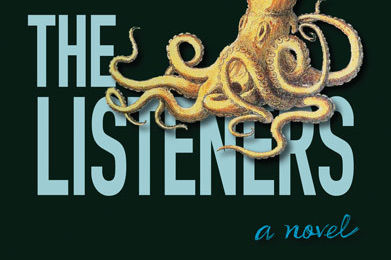A Novel of an Anarchist Nursing Home Run by 1970s Punks

A nonverbal poet glows at the center of Portlander Leni Zumas’s big-hearted novel Wolf Bells. James is 8, and he is the most gorgeously rendered character I can remember reading. Everything cold is his salvation.
At the window he put his nose against the glass, which was beautifully cold, then drew away and saw the new consistency of the air: quick and blurred and sputtering white. The changed air was leaving itself on the tree branches.
The care in those words, the sensitivity! Snow—dreaded, beloved; oppressive, angelic; shoveled, ogled—with the agency to leave itself so wonderfully on the branches! For no fault of his own, James is often in need of salvation. Like snow, he is the most beautiful problem. “The problem was not that James was autistic,” his cousin, Nola, who is 13 and is more or less his primary caregiver, thinks at one point. “The problem was that society wasn’t built for him.”
Fleeing Child Protective Services, Nola brings James to an intergenerational assisted living home run by her music teacher, Caz. “Youngs” live rent free if they care for the “olds.” Twentysomethings bogged down with college debt and seniors who can’t afford the outrageous cost of traditional assisted living help each other out. Caz inherited the woodsy minimansion-turned-nursing-home, which is in various states of disrepair. And she runs it according to the anarcho-politics she honed in the ’70s, when she led a “historically significant” but not enduringly successful punk band. Vara, her former bandmate who now uses a wheelchair, is the resident nurse. Harboring runaway minors was never part of the plan, even if her philosophy says it’s the right thing to do. “I think the kids should stay as long as they need to. Our House is about radical hospitality, right?” one resident asks Caz. “Well,” she replies, leery, “semiradical, at least.”
Wolf Bells is an ensemble novel, but it’s no doorstop saga. With poetic efficiency and beguiling shifts in tone, Zumas—a Portland State University professor whose 2018 novel, Red Clocks, won the Oregon Book Award—animates its many protagonists in a quick and hilarious 211 pages. Chapters, if that’s the right word, bear frequently repeated labels—“Kitchen,” “Library,” “Dining Room,” “Back Porch,” “Downstairs Bathroom.” Though the octagonal living room, the “Fish Bowl,” is the most emblematic: an observation chamber for this social experiment.
Setting established, the narration assumes various characters like a liquid consciousness. We lay afraid in bed, in the head of a woman suffering from dementia. Plot the ways we’ll “cut a new life” as Nola, the poignantly determined “architect of debris” on the cusp of teenage. As Marika, a Greek Jewish Holocaust survivor, we’re reminded by James of our brother, who was shot by Nazi soldiers when he was around the same age. Also as Marika, we suffer an unsolicited explanation of social media from a chirpy blogger in her early twenties named Kestrel. “You know what that is, right? Randos judging a ruthless curation of your shadow self?” We try to blow it off politely— “Sounds very special”—and then resort to more aggressive conversational ammo: “You know, my sister had a mole like yours, except hers had two hairs, not three.” There’s also cantankerous Mr. Rudd (“Prick a doodle doo, the pronouns again?”), the English former footballer sometimes called Frankenstein, who’s just as scared and confused as everyone else.
Everyone has their nuanced backstory, and a shared love-hate of the House, ambivalent about having wound up here. Some residents bond, find companionship, have sex, and others clash; everyone loves James, “little apple,” “little bear.” However, they’ve all wandered into this vacuum with virtually no strings attached. The group is as mixed as a DMV waiting room. For the most part, nobody “knows anybody here.” The House is its own kind of anarchy, a snow globe, a microcosm of a trial world organized by somewhat radical principles. And with all the potential beauty comes the ugly, funny, traumatic mess of praxis. The legality of housing the kids is what drives the plot. But the deepest insights are borne from the incessant intergenerational bickering, the push-pull of misaligned politics, and the mix of security and vulnerability this not-exactly-chosen family brings.
One resident sums up the House’s mission statement as “Screw Darwin.” Over and over, Zumas represents how, in American society, empathy is too often presented as antithetical to nature: survival of the fittest. The House, with its egalitarian principles of mutual aid, is an extremely fallible but worthwhile alternative. Another resident borrows an aphorism from the late anarcho-activist and anthropologist David Graeber. “The ultimate, hidden truth of the world is that it is something we make,” Ant, a PhD student who’s living at the house while writing his thesis, quotes to Caz, “and could just as easily make differently.” If you’re waiting for a “but,” that’s exactly the point. Ant admires Graeber’s idea, but he wants to know what Caz plans to do when the cops show up looking for the kids.
Zumas will chat about Wolf Bells with fellow Oregon novelist Lidia Yuknavitch at Powell’s City of Books at 7pm on Tuesday, September 16.




